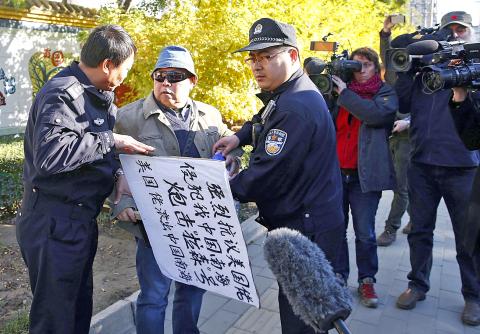Chinese media yesterday denounced the US after Washington sent a warship into disputed South China Sea waters and vowed to do so again, while netizens filled the Internet with angry diatribes, demanding a far stronger reaction from Beijing.
The disputed waters have become the stage for a burgeoning tussle between the world’s two largest economic and military powers as they struggle for regional dominance.
In the latest act, the US sent guided-missile destroyer the USS Lassen within 12 nautical miles (22.2km) of small artificial islands in the South China Sea that Beijing recently built reefs on, despite competing claims from its neighbors, including Taiwan, Malaysia, Vietnam, Brunei and the Philippines.

Photo: EPA
The US Navy is to send more warships, a US official said on Tuesday.
“We will do it again. We sail in international waters at a time and place of our choosing,” he said.
In the run-up to Tuesday’s operation, Beijing repeatedly warned that it would take firm action against any nation that violated its territorial sovereignty.
However, when the long-awaited patrol finally arrived, Beijing only tracked and warned away the vessel, without intervening physically.
Falling back on a tried-and-tested formula, it summoned the US ambassador to protest, denounced Washington’s actions and made vague threats that it would “resolutely respond.”
Commentary in Chinese state media was relatively restrained, calling for China to keep a cool head in the face of US provocations.
Even the Global Times, known for its nationalistic rhetoric, issued a call for restraint, emphasizing the need for China to show moral superiority in the face of what it described as Washington’s bullying.
“The Pentagon is obviously provoking China,” it said in an editorial published yesterday.
“If we feel disgraced and utter some furious words, it would only make the US achieve its goal of irritating us,” it added.
However, Chinese netizens demanded a stronger response from the authorities, which portray themselves as a major global power and have at their command the world’s largest military, an increasing point of pride.
Beijing has been ramping up defense spending for years as it works to transform its once corrupt and dysfunctional military into a well-oiled machine with an increasingly powerful navy capable of operating far into the Pacific region.
The US “[is] at our doorstep. Denouncing them again is useless,” one commentator said, reflecting the general mood of thousands of responses on social media site Sina Weibo.
Last month’s military parade in Beijing, celebrating the 70th anniversary of the end of World War II, featured a procession of military hardware, including missiles thought to be capable of targeting US warships.
Such displays have heightened popular Chinese expectations, and social media sites were filled with demands for decisive action.
“Can China only flap its lips?” one netizen said, adding: “Destroy the American warships that came.”

A Ministry of Foreign Affairs official yesterday said that a delegation that visited China for an APEC meeting did not receive any kind of treatment that downgraded Taiwan’s sovereignty. Department of International Organizations Director-General Jonathan Sun (孫儉元) said that he and a group of ministry officials visited Shenzhen, China, to attend the APEC Informal Senior Officials’ Meeting last month. The trip went “smoothly and safely” for all Taiwanese delegates, as the Chinese side arranged the trip in accordance with long-standing practices, Sun said at the ministry’s weekly briefing. The Taiwanese group did not encounter any political suppression, he said. Sun made the remarks when

The Taiwanese passport ranked 33rd in a global listing of passports by convenience this month, rising three places from last month’s ranking, but matching its position in January last year. The Henley Passport Index, an international ranking of passports by the number of designations its holder can travel to without a visa, showed that the Taiwan passport enables holders to travel to 139 countries and territories without a visa. Singapore’s passport was ranked the most powerful with visa-free access to 192 destinations out of 227, according to the index published on Tuesday by UK-based migration investment consultancy firm Henley and Partners. Japan’s and

BROAD AGREEMENT: The two are nearing a trade deal to reduce Taiwan’s tariff to 15% and a commitment for TSMC to build five more fabs, a ‘New York Times’ report said Taiwan and the US have reached a broad consensus on a trade deal, the Executive Yuan’s Office of Trade Negotiations said yesterday, after a report said that Washington is set to reduce Taiwan’s tariff rate to 15 percent. The New York Times on Monday reported that the two nations are nearing a trade deal to reduce Taiwan’s tariff rate to 15 percent and commit Taiwan Semiconductor Manufacturing Co (TSMC, 台積電) to building at least five more facilities in the US. “The agreement, which has been under negotiation for months, is being legally scrubbed and could be announced this month,” the paper said,

MIXED SOURCING: While Taiwan is expanding domestic production, it also sources munitions overseas, as some, like M855 rounds, are cheaper than locally made ones Taiwan and the US plan to jointly produce 155mm artillery shells, as the munition is in high demand due to the Ukraine-Russia war and should be useful in Taiwan’s self-defense, Armaments Bureau Director-General Lieutenant General Lin Wen-hsiang (林文祥) told lawmakers in Taipei yesterday. Lin was responding to questions about Taiwan’s partnership with allies in producing munitions at a meeting of the legislature’s Foreign Affairs and National Defense Committee. Given the intense demand for 155mm artillery shells in Ukraine’s defense against the Russian invasion, and in light of Taiwan’s own defensive needs, Taipei and Washington plan to jointly produce 155mm shells, said Lin,